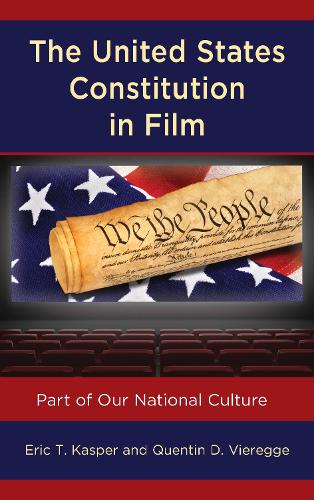
The United States Constitution in Film: Part of Our National Culture
(Paperback)
Available Formats
Publishing Details
The United States Constitution in Film: Part of Our National Culture
By (Author) Eric T. Kasper
By (author) Quentin D. Vieregge
Bloomsbury Publishing PLC
Lexington Books
13th August 2020
United States
Classifications
Professional and Scholarly
Non Fiction
Film guides and reviews
Political science and theory
791.4365540973
Physical Properties
Paperback
314
Width 155mm, Height 230mm, Spine 23mm
467g
Description
The U.S. Constitution is often depicted in popular films, teaching lessons about what this founding document means and what it requires. Mr. Smith Goes to Washington educates how a bill becomes a law. 12 Angry Men informs us about the rights of the accused. Selma explores the importance of civil rights, voting rights, and the freedom of speech. Lincoln shows us how to amend the Constitution. Not only have films like these been used to teach viewers about the Constitution; they also express the political beliefs of directors, producers, and actors, and they have been a reflection of what the public thinks generally, true or not, about the meaning of the Constitution. From the indictment of Warren Court rulings in Dirty Harry to the defense of the freedom of the press in All the Presidents Men and The Post, filmmakers are often putting their stamp on what they believe the Constitution should mean and protect. These films can serve as a catalyst for nationwide conversations about the Constitution and as a way of either reinforcing or undermining the constitutional orthodoxies of their time. Put another way, these films are both symbols and products of the political tug of war over the interpretation of our nations blueprint for government and politics.
To the contemporary student and the casual reader, popular films serve as an understandable way to explain the Constitution. This book examines several different areas of the Constitution to illuminate how films in each area have tried to engage the document and teach the viewer something about it. We expose myths where they exist in film, draw conclusions about how Hollywoods constitutional lessons have changed over time, and ultimately compare these films to what the Constitution says and how the U.S. Supreme Court has interpreted it. Given the ever-present discussion of the Constitution in American politics and its importance to the structure of the U.S. government and citizens rights, there is no question that the popular perceptions of the document and how people acquire these perceptions are important and timely.
Reviews
"The U.S. Constitution in Film is a book based on the brilliant idea of exploring the American founding document through popular culture. Students will be able to instantly make the connection between well-known movies and how the Constitution actually works. I think this book will prove to be uniquely engaging for readers hoping to understand American law. Highly recommended." -- Hunter Baker, Dean of Arts and Sciences, Union University
Part of Our National Culture: The U.S. Constitution in Film could be called a film buffs guide to the Constitution. Each chapter is an in-depth essay on constitutional interpretation, illustrated with film plots, thus providing the reader with both an understanding of the Constitutions complex meanings over time and of the ways films have supported or undermined different constitutional views. Many books have analyzed American films approach to Congress and the presidency, but few have also examined Hollywoods views of gun rights, a free press, etc. Where else can one read a detailed examination of the application of the Exclusionary Rule in Dirty Harry
-- John Heyrman, Berea CollegeThe United States Constitution in Film: Part of Our National Culture draws on an encyclopedic knowledge of popular culture and politics to reveal invaluably how film has shaped our understanding of the U.S Constitution. This important work unpacks films portrayals of myths about the Constitution while recounting more generally Hollywoods changing relationship with the text itself. In so doing, this book provocatively considers how both film and the constitution remain central to American discourse, raising critical and timely questions about how our perceptions of the Constitution are perpetually re-framed. -- Aimee Pozorski, Central Connecticut State University
Author Bio
Eric T. Kasper is associate professor of the department of political science at University of Wisconsin-Eau Claire
Quentin Vieregge is associate professor of English at UW-Eau Claire-Barron County
